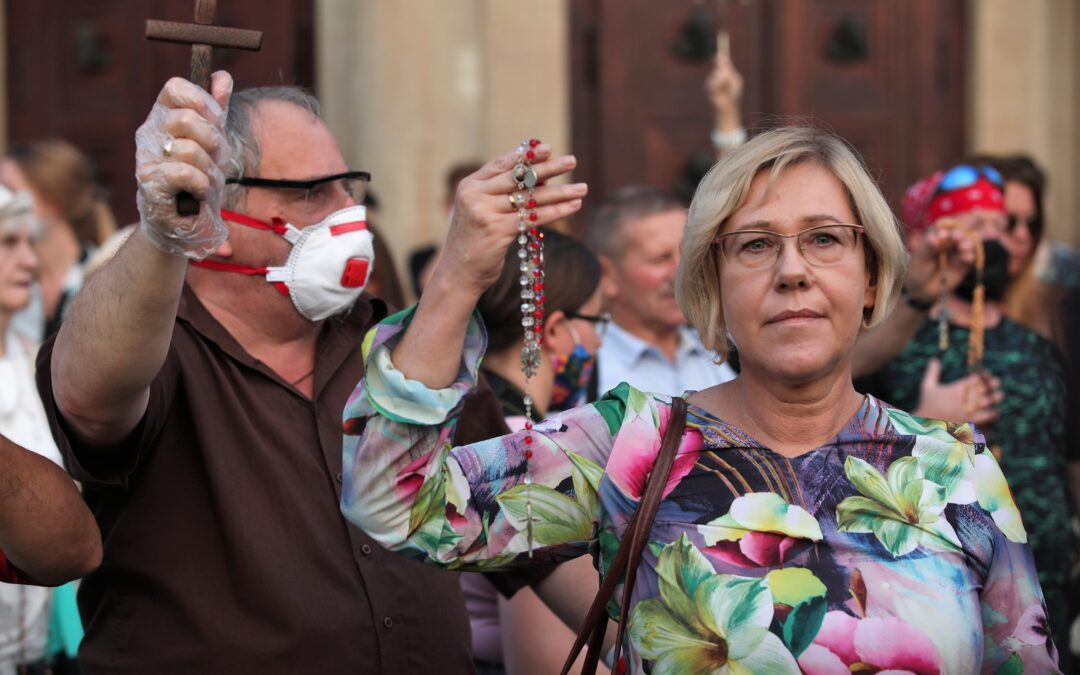The head of the education board in one of Poland’s provinces has advised schools against organising trips to see a new staging of the classic drama Dziady, also known in English as Forefathers’ Eve, written in the 19th century by Adam Mickiewicz, Poland’s most celebrated poet.
She called the production “anti-government” and “against the national interest”. The theatre where it is being staged has responded by expressing “surprise and concern” at her remarks. It invited audiences to come and judge for themselves, saying that “theatre is a space of meeting and dialogue”.
The education minister in Poland’s national-conservative government has, however, thanked the local superintendent for her intervention. He called the play a “desecration of art”.
ODRADZAM organizację wyjść szkolnych na spektakl "Dziady" w Teatrze J. Słowackiego. W mojej ocenie, haniebne jest używanie dzieła wieszcza A. Mickiewicza dla celów politycznej walki współczesnej opozycji antyrządowej z polską racją stanu https://t.co/zuev3Ifx8e
— Barbara Nowak (@Br_Nowak) November 23, 2021
Barbara Nowak, who has often courted controversy since being appointed in 2016 by the government as education superintendent of Małopolska – a region of 3.4 million with its capital in Kraków – yesterday tweeted that she “advised against” organising school trips to see the production.
“In my view, it is shameful to use the work of the bard Adam Mickiewicz for the purposes of the political struggle of the contemporary anti-government opposition against the Polish national interest,” she wrote.
A longer statement on the Kraków department of education website claimed that the production is characterised by “inappropriate contents harmful to children and school pupils that do not match the objectives of the education system”.
This interpretation of the play is made by people “who wish to form a view of contemporary Poland not with the care and love due to our homeland, but with hatred for its historical lineage and an identity of the nation founded on the tradition of Latin civilisation,” it continued.
In a speech this afternoon, the education minister, Przemysław Czarnek, thanked Nowak for her intervention. “We live in a time when beauty is deformed, such as in Kraków,” he said, describing the play as “trash” and a “desecration of art”. One “cannot be silent in the face” of this, he added.
Promotional material for the new production says that it shows how “today two Polands is our everyday life – two nations fighting against each other”.
“Poets stand between the sides fighting in a fratricidal war,” it continues. “Conservative Poland wants to appropriate the poets. To shut their mouths…It wants to appropriate the national history and rewrite it.”
In a review of the production, Dziennik Polski – a newspaper that is part of a media group recently taken over by a state oil firm – said that it shows “a picture of a Poland divided between the dance floor and war with everybody over everything”. Liberal daily Gazeta Wyborcza proclaimed it the most important premiere of the year.
In response to Nowak’s criticism, representatives of the theatre expressed “great surprise and concern”. They wrote that “Dziady is an absolute masterpiece of Polish literature. As such it is an open, multi-faceted work that is not easy to evaluate and interpret”.
The second part of Dziady is a set text for pupils in the last two years of primary school, while those in high school read the third and fourth parts. An unfinished first part of the drama was published after Mickiewicz’s death.
“Like every work of art, it has been subjected to many creative interpretations, with productions always corresponding with the times when they were staged,” said the theatre in its statement. “In this case, the director read Mickiewicz’s work very carefully and filtered it through the Polish present day.”
They declared themselves “proud” of “a wise, courageous production holding a perceptive dialogue both with Mickiewicz’s text and with the reality surrounding us”.
“Theatre is a space of meeting and dialogue. We firmly believe that by creating plays, watching them, discussing them, and even arguing about them, we create a shared space of mutual understanding and empathy.”
As a result of Dziady’s subject matter, with strong national romantic elements, productions of the play have always been open to political interpretation.
The student protests of 1968 in communist Poland, which prompted a brutal crackdown by security forces, were triggered when Kazimierz Dejmek’s production of Dziady at the National Theatre in Warsaw was banned by the government.
The latest incarnation of Dziady, which is open to theatregoers aged 15 and over, premiered last week, 120 years after the premiere of Stanisław Wyspiański’s famous production in the same theatre. Directed by Maja Kleczewska, it also features a woman, Dominika Bednarczyk, in the traditionally male role of Konrad.
Nowak’s warnings yesterday reportedly had the opposite effect to the intended one. The remaining shows until the end of the year are all sold out, although some tickets are still available for January’s performances.
Main image credit: Jakub Wlodek / Agencja Gazeta

Ben Koschalka is a translator, lecturer, and senior editor at Notes from Poland. Originally from Britain, he has lived in Kraków since 2005.




















